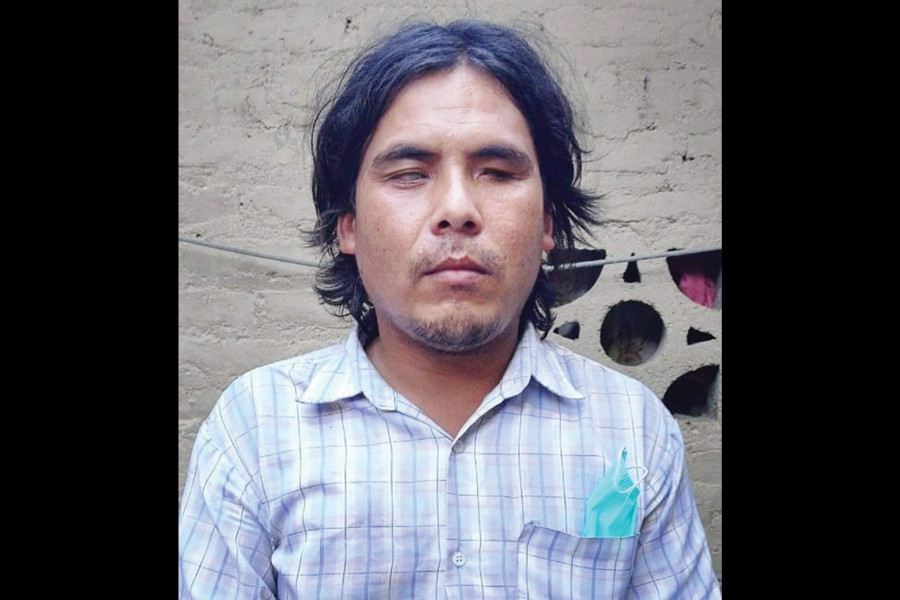Valley
Lockdown has been especially hard on Valley’s visually-impaired persons
Most of the visually-impaired persons in the Valley were employed in the informal sector.
Anup Ojha
Yam Bahadur Gurung is a visually-impaired man but he is gifted with a good singing voice. Until the Covid-19 lockdown started in March last year, he had a busy schedule singing at various functions besides a regular evening job at the Indreni Dohori Sanjh, a restaurant with traditional Nepali live music, at Koteshwor in the Capital.
After the country reported just two cases of Covid-19, the government imposed a nationwide lockdown from March 24, which led to the closure of businesses including the restaurant where he sang. Gurung, 31, became jobless. So he left his rented room at Kapan, Kathmandu and headed for his home village of Bandipur in Tanahun district.
“I had returned to the village after eight years and I had thought life would be easier at home, but it wasn’t,” said Gurung. According to him his father and younger brother still live in Bandipur, but managing even two meals a day is difficult for them.
He had left the village for Kathmandu in 2012 after the death of his mother. She was just 44 when she died.
When he was five years old, Gurung lost his eyesight due to typhoid fever. “Our family was too poor to afford any treatment. If I had received treatment I wouldn’t be blind,” Gurung said.
After spending four months in the village, he returned to Kathmandu after the government lifted the lockdown in July last year. Jobless and penniless, he joined his other blind friends and started singing on the roadside. “We would mostly sing in the Pashupati area because there were many visitors and they gave us money,” he said.
But nine months later, amid rising cases of Covid-19, the government again imposed prohibitory orders from April 29 and Gurung was deprived of his livelihood. “I don’t have any savings and I am surviving on the food provided by a kind-hearted man,” said Gurung.
Gurung is equally worried about paying the room rent, which he hasn’t for three months. “I don’t know how I will survive if the lockdown continues,” he said.
Like Gurung, another visually-impaired Bimal Khatri, 27, has lost his means of livelihood since the lockdown started in Kathmandu in April. He came to Kathmandu four years ago from Surkhet district and sold joss sticks by going door-to-door.
His wife Mandira, 25, is partially blind and is four months pregnant.
“She needs nutritious food but we have already used up our savings in the past one month of the lockdown. So, more than myself I am worried about my wife,” Khatri lamented.
The Khatris also owe their landlord Rs 16,000 in rent money.
Gurung and Khatri are just representative cases of how the visually-impaired people with no regular sources of income have been suffering in the Capital due to the Covid-19-induced lockdown.
According to the 2011 census, 1.94 percent of the country’s population is living with some form of disability, with as many as 23,549 people in Kathmandu Valley alone.
Sudarshan Subedi, a former president of the National Federation of the Disabled, said there are around 4,000 visually-impaired people in the Valley, and the lockdown has been especially hard on them because most of them earned their livelihoods working in the informal sector and are currently jobless.
“I have been getting numerous phone calls from visually-impired people seeking help. Most of them say they have run out of food and others say their landlords have threatened to evict them for not paying rent,” said Subedi.
On Wednesday, the chief district offices of Kathmandu extended prohibitory orders for another 10 more days starting from Friday.
“I am not afraid of dying because life has always been a struggle since I was a child. But this lockdown has upended everything because not only that I cannot go out, I also cannot touch anyone or anything, and this makes things really difficult for a visually-impaired person.”




 13.12°C Kathmandu
13.12°C Kathmandu.jpg)













